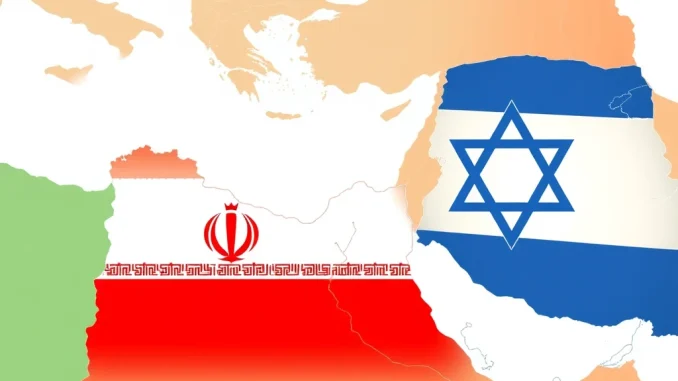
Geopolitical storms brewing in the Middle East often send ripples across global financial markets. For cryptocurrency investors, understanding these dynamics is crucial. The latest development involves a stark warning from a senior Iranian military commander, signaling potential escalation in the ongoing Iran Israel conflict. This news, reported by Iran’s official news agency IRNA and cited by Odaily, highlights a significant Geopolitical risk that warrants close attention, especially when considering its potential Crypto market impact.
What’s Behind the Escalating Iran Israel Conflict?
The report cites a senior Iranian military figure stating that attacks against Israel are poised to intensify in the coming hours. This follows a period of heightened tension and direct exchanges between the two nations. Understanding the context is key:
- **Recent History:** Direct military confrontations have become more frequent, moving beyond proxy conflicts.
- **Stated Intent:** The commander’s statement, as reported, indicates a clear intention for further, potentially rapid, escalation.
- **Information Source:** The report originates from IRNA, the official state news agency, lending it a degree of governmental weight, though interpretation of state media is always necessary.
This development doesn’t occur in a vacuum. It’s part of a complex regional dynamic involving various state and non-state actors, all contributing to the overall Middle East tensions.
Why Does Geopolitical Risk Matter for Crypto?
While cryptocurrency markets operate 24/7 globally and are often seen as separate from traditional finance, they are not immune to macroeconomic and geopolitical forces. Geopolitical risk, such as the potential for conflict escalation, can influence crypto markets in several ways:
Firstly, it can trigger broader market risk-off sentiment. When global instability rises, investors often move away from perceived riskier assets. While crypto’s classification as ‘risky’ or ‘safe haven’ is debated, it frequently correlates with traditional risk assets like tech stocks.
Secondly, specific events can affect regional access to finance or increase the appeal of censorship-resistant assets. In areas experiencing conflict or under sanctions, cryptocurrency can sometimes be used as an alternative means of value transfer, though this comes with its own set of risks and regulatory challenges.
Thirdly, major geopolitical events can impact energy prices, supply chains, and overall economic stability, all of which can indirectly influence investor confidence and capital flows into digital assets.
Exploring Potential Crypto Market Impact
The immediate concern for many investors following news like the Iranian commander’s warning is the potential Crypto market impact. Historically, Bitcoin price and other cryptocurrencies have shown varied reactions to global crises. Sometimes, Bitcoin is speculated to act as a ‘digital gold’ or safe haven asset, seeing inflows during uncertainty. At other times, it trades more like a risk asset, falling alongside stocks.
Predicting the exact reaction to the current Middle East tensions is challenging. Factors influencing the Crypto market impact include:
- **Severity of Escalation:** Minor incidents may have little effect, while widespread conflict could cause significant volatility.
- **Global Economic Context:** The state of the broader economy (inflation, interest rates) influences how investors react to risk.
- **Market Sentiment:** Existing bullish or bearish sentiment in the crypto market can amplify or dampen the effects of external news.
- **Liquidity:** Market depth and trading volume at the time of the news can affect price movements.
Analysts are closely watching Bitcoin price charts for signs of reaction. Significant news events like this can lead to rapid price swings, highlighting the volatility inherent in the market.
Navigating Middle East Tensions: Actionable Insights
Given the backdrop of ongoing Middle East tensions and the potential for increased Geopolitical risk, what steps can cryptocurrency investors consider? While this is not financial advice, general principles for navigating uncertainty include:
- **Stay Informed:** Monitor reliable news sources regarding the Iran Israel conflict and broader geopolitical developments.
- **Assess Risk Tolerance:** Understand your own comfort level with market volatility that can arise from such events.
- **Consider Diversification:** Ensure your portfolio isn’t overly concentrated, which can help mitigate risks from unexpected market movements.
- **Avoid Emotional Decisions:** Rapid price changes driven by news can lead to panic selling or impulsive buying. Stick to a predefined strategy if possible.
- **Long-Term Perspective:** For many crypto investors, focusing on the long-term potential of the technology can help weather short-term volatility driven by external events.
The link between global politics and financial markets, including crypto, is undeniable. While the core news is about military warnings, its potential spillover effects on investor behavior and market dynamics make it relevant for anyone holding digital assets.
Summary: Watching the Horizon
A senior Iranian commander’s warning of escalating attacks on Israel introduces a significant element of Geopolitical risk into the global landscape. This development, stemming from the complex Iran Israel conflict, adds to existing Middle East tensions. For the cryptocurrency market, this translates into potential volatility and uncertainty regarding the short-term trajectory of asset prices, including the Bitcoin price. While the exact Crypto market impact remains to be seen, staying informed about these external factors is an essential part of navigating the often unpredictable world of digital assets. As the situation unfolds, market participants will be closely watching for how this increased geopolitical risk influences trading behavior and asset valuations.



